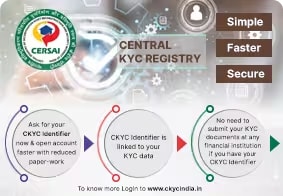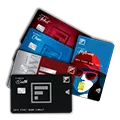Enjoy Zero Charges on All Commonly Used Savings Account Services
- About Us
- MD & CEO letter about the bank
- MD & CEO
- Our History
- Letter to Shareholders on the 1st Annual Report after Merger
- Letter to Shareholders on the 2nd Annual Report after Merger
- Letter to Shareholders on the 3rd Annual Report after Merger
- Letter to Shareholders on the 4th Annual Report after Merger
- Board of Directors
- Awards & Accolades
- News Room
- Investors
- Careers
- ESG
-
Customer care hotlineCall 1800 10 888
-
As per amendment in the Income Tax Rules, PAN or Aadhaar are to be mandatorily quoted for cash deposit or withdrawal aggregating to Rupees twenty lakhs or more in a FY. Please update your PAN or Aadhaar. Kindly reach out to the Bank’s contact center on 1800 10 888 or visit the nearest IDFC FIRST Bank branch for further queries.
-
-
FinFIRST Blogs
The share market in India works on an electronic depository system where shares are held in demat or dematerialised form instead of physical certificates. To be able to buy or sell shares in the stock market, investors need to open a demat account with a Depository Participant (DP). The DP provides services like holding securities in demat form and facilitating transactions from the investor's demat account. For these services, the DP charges certain fees from the investor which are known as DP charges. Read on to find out more.
READ MORE
What is a depository participant?
A Depository Participant (DP) is an agent of depositories like National Securities Depository Limited (NSDL) and Central Depository Services Limited (CDSL). The DP maintains investors' demat accounts and handles activities like dematerialisation of shares, holding securities in demat form, settling transactions, and providing statements of transactions and holdings.
The DP is essentially the intermediary between the depository and the investor. Some examples of DPs are banks, brokers, financial institutions, etc., who have been registered with the Securities and Exchange Board of India (SEBI) to offer demat account services. An investor needs to open a demat account with a DP in order to be able to transact in the stock markets.
With no balance requirements and minimal charges, the IDFC FIRST instant demat account is ideal for retail investors looking for a convenient demat account for long-term investing that can be managed digitally.
What are the types of demat accounts?
There are mainly three types of demat accounts offered by depository participants:
1. Basic Services Demat Account (BSDA): This is a basic account with limited services. It is meant for retail investors who only want to buy and hold securities and do not trade frequently. BSDA has very low Annual Maintenance Charges (AMC).
2. Regular demat account: This is the standard demat account ideal for investors who trade actively. It provides all the basic demat account facilities as well as additional services. The charges are also higher than BSDA.
3. Margin demat account: This account allows the investor to trade in equities by taking leverage from the broker against the securities held in the account. Margin demat accounts are ideal for intraday and F&O traders.
How to reduce DP charges?
Here are some ways in which investors can reduce the DP charges while trading and holding securities in demat form:
- Opt for a BSDA account if you are a retail investor who buys and holds for the long term. The AMC is very low at around ₹100 to ₹300 per year.
- Choose a DP that offers lower account opening, AMC, transaction, and custody charges. Compare charges of various DPs and brokers offering a demat account before selecting one.
- Consolidate your holdings under one demat account instead of multiple accounts. This reduces overall charges.
- Consolidate multiple scrips into one ISIN when possible. Charges are normally levied per ISIN, so this reduces charges.
- Do off-market transfers instead of selling and buying back. Off-market transfers have lower charges compared to buy-sell transactions.
- Avoid frequent transactions. Charges are applied for every transaction.
- Track your demat holdings and charges regularly. Raise any discrepancies immediately with the DP.
IDFC FIRST Bank demat account
IDFC FIRST Bank offers an instant online demat account with zero account opening and annual maintenance charges for the first year. It can be opened instantly through digital KYC with basic details and documents.
The IDFC FIRST demat account allows seamless investing in shares, mutual funds, and other securities directly from the bank account. Key features include paperless account opening, nominee registration, access to IPO and NFO applications, and integrated bank and demat account statements.
Conclusion
DP charges constitute a significant cost for active traders and long-term investors in the share market. While basic DP services are essential for investing in the share market, investors should choose a DP with affordable charges, use services prudently, and keep costs low without compromising the quality and security of holdings and transactions. The key is to maximise the value derived from the DP services relative to the costs incurred.
Disclaimer
The contents of this article/infographic/picture/video are meant solely for information purposes. The contents are generic in nature and for informational purposes only. It is not a substitute for specific advice in your own circumstances. The information is subject to updation, completion, revision, verification and amendment and the same may change materially. The information is not intended for distribution or use by any person in any jurisdiction where such distribution or use would be contrary to law or regulation or would subject IDFC FIRST Bank or its affiliates to any licensing or registration requirements. IDFC FIRST Bank shall not be responsible for any direct/indirect loss or liability incurred by the reader for taking any financial decisions based on the contents and information mentioned. Please consult your financial advisor before making any financial decision.
The features, benefits and offers mentioned in the article are applicable as on the day of publication of this blog and is subject to change without notice. The contents herein are also subject to other product specific terms and conditions and any third party terms and conditions, as applicable. Please refer our website www.idfcfirstbank.com for latest updates.


 What's special about us
What's special about us




















